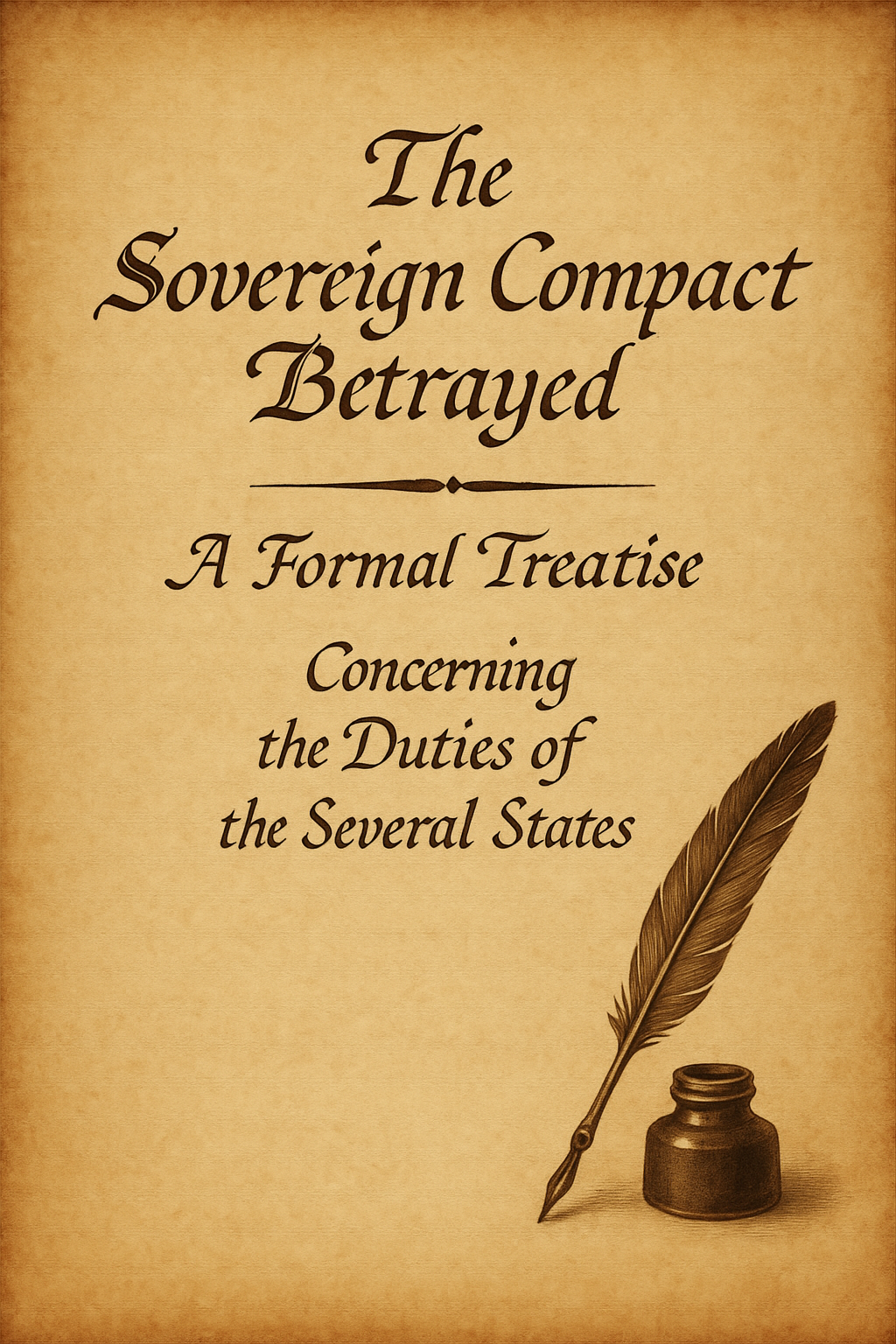TheSovereign Compact Betrayed

☉ The Sovereign Compact Betrayed ☉ A Formal Treatise Concerning the Duties of the Several States, the Limits of Federal Forbearance, and the Present Danger of Asymmetric Insurrection Under the Guise of Sanctuary and Civil Dissent Penned in the voice of a Most Sober and Reasoned Founding Father Anno Domini 2025 — ☙ Preamble ☙ To the People of These United States, and to Posterity: It is the lament of our times that the foundations of our Republic, having weathered many storms—foreign tyrants, domestic division, and the passions of mobs—now face a more insidious erosion: not by the sword, nor by vote, but by deliberate abstention from duty cloaked in the language of justice. The cause of this treatise is no trivial dispute among factions, but the essential matter of the Union's Integrity. For we address the question: > May a State, whilst enjoying the protections of the Federal Compact, refuse its obligations therein, abet unlawful actors, and incite disorder against lawful authority—yet claim to be in good standing with the Union? We answer in the negative. — ☉ Article I: On the Nature of the Compact and the Supremacy of Federal Law The several States entered this Union not as sovereigns in perpetuity, but as sovereigns bound by Compact—their sovereignty bounded by the necessities of mutual defense, justice, and interstate harmony. To that end: The power to establish rules of naturalization and immigration is expressly enumerated to the Congress. The enforcement of such law is executed by officers of the Union, who may operate in every state. That any State should interpose itself—refusing cooperation, withholding resources, or frustrating the execution of these laws—is to nullify that which it cannot repeal, an echo of that pernicious doctrine which once shattered our Union and drew forth much blood to suppress. — ☉ Article II: Of Sanctuary Policies and the Spirit of Insurrection We acknowledge the anti-commandeering principle, rightly drawn from fears of federal overreach. Yet we distinguish: Between abstention from enforcement and obstruction of enforcement. Between disagreement with law and the empowering of its violators. When a State: Provides refuge to those in defiance of federal law, Instructs its officers to deny lawful detainer requests, Hinders communication with federal agents, And levies lawsuits against those who would enforce immigration statutes... …it is not merely passive. It is complicit in the fracturing of our lawful order. Let no man mistake such conduct for noble resistance. It is, by all measures of compact and conscience, a betrayal of federal unity, and stands on the precipice of insurrection. — ☉ Article III: On Riots, Guerrilla Warfare, and the Failure to Quell Domestic Violence Now let us consider a deeper treachery: when a State not only refuses to uphold federal law, but refuses to suppress mob violence that: Destroys the property and livelihood of lawful citizens, Occupies or besieges federal buildings, Prevents the lawful operation of Immigration and Customs authorities, Intimidates or assaults officers of the law... …it ceases to be mere disorder. It is asymmetric insurrection. This is not dissent. This is not protected assembly. This is war—waged not by declared armies, but by masked battalions who claim justice, yet deliver ruin. And when a State refrains from suppressing such riotous mobs—indeed, when it excuses, enables, or celebrates their acts—it abdicates its republican duty and invites federal intervention under Article IV, Section 4, which binds the Union to guarantee protection against domestic violence. — ☉ Article IV: Of Reciprocity, Trust, and the Right of Redress by Other States One State’s sanctuary is another’s burden. When Washington, Oregon, or California acts to shield non-citizens from lawful removal, it: Distorts labor markets across borders, Increases fiscal burdens on the Union, Harms other States who remain faithful to the Constitution. This is not compassion—it is hostility disguised as virtue. It is within the right of the faithful States to demand redress—be it through the courts, the Congress, or, if the betrayal persists, through compacts of mutual defense and lawful resistance to internal subversion. — ☉ Conclusion: A Call to Renewal Let no man mistake this for a call to civil war. Rather, it is a call to civil clarity: > To affirm that the Union exists not as a convenience of geography, but as a covenant of duty. Let the Constitution be our light. Let duty—not ideology—be our compass. But should the present course persist—wherein some States give harbor to violators, defy the Union's laws, and refuse to put down riotous insurrection—then they place themselves outside the Compact. And what the Founders defended by musket and parchment, we too must defend—by truth, by law, and by unwavering allegiance to the Republic for which our ancestors bled. So say we, as citizens of a Sovereign but United People. Let this be our Resolve. —